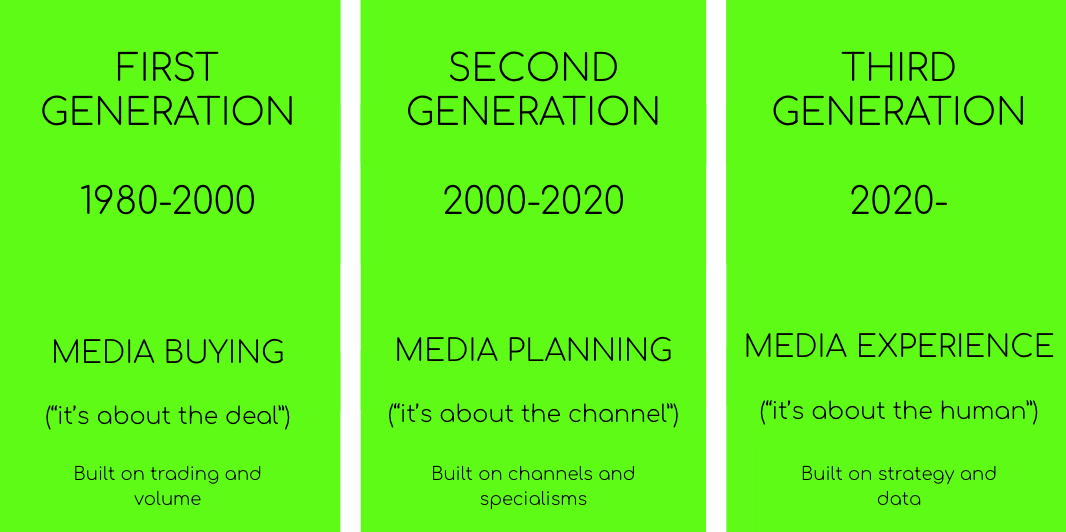We’ve been doing some pro-bono strategy work with the UN World Food Council recently. On a call this week, after the introductions, one of the clients said: “I don’t know what media experience really means, but I like the sound of it - it sounds… modern”.
It does sound zeitgeisty. We also admit there’s a whiff of the soundbite about it. Let’s face it, agencies aren’t exactly shy about repackaging the prosaic and mundane as something revolutionary and epoch-defining. But unlike so much of the guff and bluster espoused by the industry, there is substance behind this. It’s more than just positioning puffery and pitch posturing.
We believe that today we’re at a remarkable point in time when it comes to media, especially when you examine it through the the prism of the advertising industry. There’s a vast disconnect between what media actually is - the binding, connective cultural tissue of society; the ‘extension of man’ (as McLuhan put it) which educates, entertains and enrages in equal measure - and how our industry (still) treats it, as a fundamentally inert, tradable commodity; essentially interchangeable units of currency that take a commercial message from point A (a brand) to point B (a ‘customer’). Most media thinking in agencies (no matter what they tell you) still plays little to no attention to the most important part of how media really works: the human experience that the medium generates. To understand why this is the case, we need to examine how media agencies have evolved.
When media as a discipline first decoupled from creative agencies, we had what we call ‘the first great age of media agencies’ - the age of media buying. This ran up until around the turn of the millenium. This era was defined by trading - by buying as many eyeballs as cheaply as possible. Emboldened by a lack of choice (and competition), vast deals were struck, and the popular narrative was defined by titans such as Carat, Zenith and Mediacom. It didn’t really matter which eyeballs you bought, or where, or when, just so long as they were plentiful - and cheap (and of course, so long as they came with a long lunch when Friday rolled around).
Fragmentation ruined all that. Whilst the agencies mentioned above are still dominant, they had to change their philosophy somewhat as the ‘second great age’ emerged around 2000. This was the age of specialist media planning. Whilst of course buying - and price - remained important, the discourse was no longer lead by volume. Specialist channel thinking became the dominant conversation. Pioneering independent agencies like Naked, Michaelides & Bednash and Goodstuff changed the narrative and forced a total rethink. They started to think about consumer journeys and began to develop intricate multi-media planning models. Systems and tools were built to approximate and guess people’s behaviour, and this was used to build evermore complex plans. Later on, great specialist agencies like Rocketmill, Croud and Jellyfish formed and honed in on digital channels specifically and became experts in applying marketing and media thinking to very precise areas to great effect. And as digital - and tracking - became more powerful, these agencies became more effective.
Stalls were set out, and people stuck to them. And when agencies tried to switch between them - brand to performance, or offline to digital - they found it very tricky. Specialists were specialists.
And now, here we are. 2021. Post digital. Privacy first. With the loss of third-party cookies, we simply can’t track people to the nth degree like we used to. We have to go back to basics. Thinking about the human condition. Brands can no longer afford to rely on siloed, specialist thinking in a world where the ever-so-convenient linear customer journey no longer exists (if it ever did) and has been usurped by a hyper-navigaviable ‘messy middle’. Media price is still, of course, important. But it is the most important thing? We’d argue no: it’s a hygiene factor, not a differentiator. Value, not cost. Are channels the most important thing? Perhaps controversially, we believe the debate around channels is now far less relevant than the debate around platforms. Digital and data has shifted this, forever. Media is critical, channels aren’t. Furthermore, we don’t have to guess what people are doing. We can observe it, at scale.
The Third Age of Media Agencies, we believe, is Media Experience. A discipline that works hand-in-glove with UX and CX. Respecting media for the cultural force that it truly is. An obsession with how people actually experience media. Design over planning. A rejection of channel obsession in favour of systems thinking. Not brand or performance, but brand and performance. Humans, not consumers. Outcome, not output. Creative and data, together, at the very heart of our business.
It sounds like a set of lofty ambitions.
But why bother trying if you’re not going to go big?


